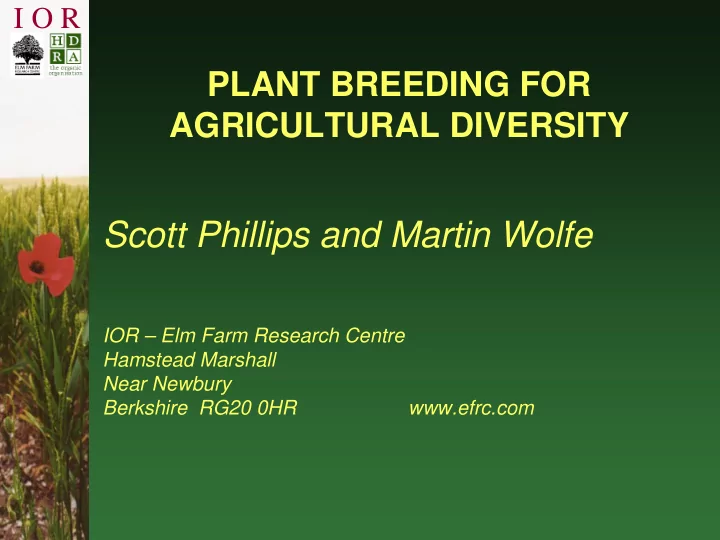

I O R PLANT BREEDING FOR AGRICULTURAL DIVERSITY Scott Phillips and Martin Wolfe IOR – Elm Farm Research Centre Hamstead Marshall Near Newbury Berkshire RG20 0HR www.efrc.com
I O R The importance of biodiversity for ecosystem dynamics and structure • Greater number of terrestrial plant species can lead to greater ecosystem productivity and resource use • Greater diversity can lead to greater ecosystem predictability and temporal stability Tilman et al. Cedar Creek Biodiversity Experiment, Minnesota.
I O R (Agro)Ecosystem Services: The productivity and stability of ecosystems is important because agroecosystems need to: 1. Provide services to support agricultural production 2. Provide services that contribute directly to the quality of life of humans 3. Provide services that contribute towards global life-supporting functions
I O R … Therefore should aim to maintain and increase agrobiodiversity, but monoculture dominates modern agricultural ecosystems
I O R Wheat Ideotype Design for Monoculture Crop characteristic Corresponding features of crop ideotypes Intense competition within the Capacity to accept crowding crop Capacity to respond to high Little increase in the mutual fertility competition among plants as they respond to fertiliser All controllable factors Effective disposition of the foliage for ameliorated so use light to the the utilisation of light best advantage High harvest index Only a part of the crop is of significant value After Donald, (1968)
Wheat Ideotype Design for Monoculture I O R
I O R A heterogeneous crop of a single species – variety mixtures But we are currently reliant on mixing varieties bred using the monocultural ideotype
I O R However, even with inappropriate varieties, variety mixtures show (1) ecological effects : • Complementation • Compensation And (2) epidemiological effects : • Barrier effects • Induced Resistance • Dilution of susceptibles
I O R Heterogeneity also provides (3) evolutionary dilemmas After Priestly, 1978 In mixtures – Pursue maximum success on any one component? Or Attack as many components as possible?
I O R Selection of pure lines for good ecological combining abilities: Passive Approach – one component in all possible binary combinations: General Combining Ability Active Approach – alternate cycle of ‘tester’ and ‘tested’: Specific Combining Abilities
I O R The neo-Darwinian view of the process of evolution: (1) The initial generation of variability (2) Recombination (3) Differential reproduction (4) Isolation in space and time Evolutionary plant breeding repeatedly harnesses all four stages of the evolution process Suneson (1956)
I O R Composite Cross breeding process Parent Lines Parent Lines x F 2 Composite Cross Population Natural + Directed Mass Selection (involves all stakeholders – farmers, breeders etc.) F 3 Composite Cross Population
I O R Selection of parent lines High Yield Potential High Quality Potential 1 Bezostaya 1 Bezostaya 2 Buchan 2 Cadenza 3 Claire 3 Hereward 4 Deben 4 Maris Widgeon 5 High Tiller Line 5 Mercia 6 Norman 6 Monopol 7 Option 7 Pastiche 8 Tanker 8 Renan 9 Wembley 9 Renesansa 10 Soissons 11 Spark 12 Thatcher + 4 male sterile lines
I O R Composite Cross Populations High Yield High Yield High Quality & Quality Population Population Population High Yield High Yield High Quality & Quality Population Population Population + HMS + HMS + HMS
I O R Adaptation versus Adaptability Adaptation Adaptability Current – pure High Low bred lines Composite High High cross populations
I O R However, breeding for agricultural diversity needs: (1) shifts in legal and administrative frameworks. (2) appropriate marketing (3) adaptation of genotypes to particular production systems requires farmer participation
Recommend
More recommend